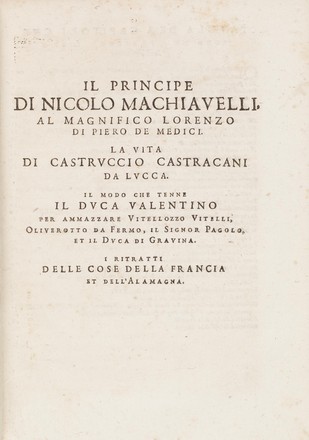
Il Principe
Il Principe by
Niccolo Machiavelli, c 1610
In
Tutte le opera di Nicolo Machiavelli
cittadino et secretario fiorentino
Leather
bound volume
SC/0952
The Prince or Il Principe by Niccolo Machiavelli was written in 1513 and is still considered to be one of the most influential political works in the Western world. It is a persuasive account of how political power is won and lost and the role luck plays in the affairs of government. Machiavelli was an Italian philosopher, historian and diplomat who dedicated The Prince to Lorenzo de Medici (1492-1519) Lord of Florence, in the hope of gaining favour and employment with the powerful Medici family. Originally written in his native Italian rather than the scholarly Latin, The Prince was circulated as a manuscript before finally being published in 1532, nearly five years after his death.


 Back to list
Back to list